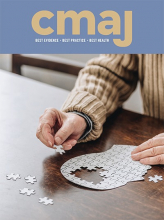
Jillian Horton: You were mentored by Dr. David Sackett. What did you learn from him?
Sharon Straus: The first time I met with Dave Sackett, he asked me what I wanted in my life and career, then said, “My goal is to help you realize that dream, and I will do whatever I can to help you achieve your goals.” I was stunned into silence. When somebody says that to you, it’s such a powerful thing. And I realized soon that he meant it. The only thing he ever asked of me in return was that I do the same thing for others.
JH: Is there evidence on the effectiveness of mentorship?
SS: I did two systematic reviews, one on the quantitative literature and one on the qualitative literature. People who are mentored are happier in what they are doing. People who are mentored are more likely to stay at their institution. Mentorship leads to more protected time for scholarly activities, more grants and publications. It has a huge impact on mentees, and the impact on mentors is massive. It keeps us interested. It keeps us stimulated and engaged … important things that we shouldn’t underestimate.
JH: What’s the best way to initiate mentorship?
SS: There’s no single best way, but we certainly know from the literature that just assigning people mentors without having a thoughtful approach tends to lead to superficial relationships. One of the strategies that’s probably more helpful is meeting with potential mentees and finding out what their interests and career goals are, then providing them with a list of potential mentors and facilitating relationships.
JH: How can mentees seek out and formalize that relationship?
SS: Ask yourself: who’s out there? Who’s got the career that you’re interested in? Reach out to them. What’s the worst thing that could happen? They might ignore your email. But they might say yes. When somebody reaches out, that’s a huge compliment to the mentor, and most people will respond to that. If you’ve identified certain people and maybe you don’t feel comfortable reaching out, who are the people who could help you reach out?
JH: What barriers do women face in securing mentorship?
SS: Evidence suggests there’s a perception that women have a harder time finding mentors in academia, and if they want to find a mentor who’s female, especially in positions of leadership, those are hard to find. Similarly, access to informal networking opportunities — the opportunities to get exposed to people who would be mentors — are lacking.
JH: What are your top mentoring tips?
SS: Make sure that it’s a safe and trusting environment: this is a safe space, what we discuss here stays here, unless — with your permission — you want me to advocate on your behalf. The mentee is in the driver’s seat. It’s about being mindful that it’s about their vision. I remember that whenever I was considering something and if I wanted to discuss it with Dave [Sackett], he would always start off with a list of questions, really getting me to think. I didn’t have to worry about pleasing him or doing what he thought I should do. He wanted to make sure I was clear about what I wanted to do.
JH: What are your thoughts about a recent article that suggested that in the “Me Too” era some men wouldn’t want to mentor women?
SS: I worry a little bit about that we’ve kind of lost track of what it is that we’re trying to achieve. The point is that if you look at the characteristics of a good mentor, we’re not asking somebody to be superhuman or for anything special. It’s about being decent human beings.
Footnotes
Sharon Straus is a geriatrician and clinical epidemiologist. She is the Director of the Knowledge Translation Program and Physician-in-Chief at St. Michael’s Hospital, and a professor in the Department of Medicine at the University of Toronto.
The interview was conducted by Dr. Jillian Horton, director of the Alan Klass Health Humanities Program at the Max Rady College of Medicine, University of Manitoba, Winnipeg. She hosts Med Life with Dr. Horton on CMAJ Podcasts.
This is an excerpt from a longer podcast. You can listen to the full interview here: cmaj.ca/medlife











